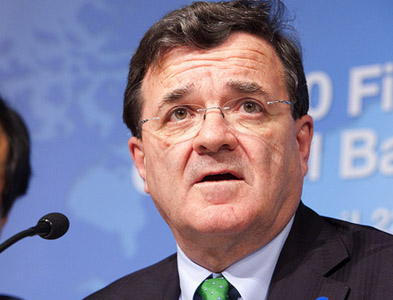Parliament is back this week, and its focus this fall will be on what to do about the economy. The first order of business should be reducing unemployment, but the Conservatives are more interested in reducing the deficit.
Want to reduce the government deficit? Raise business investment? Improve the standard of living? Moving to full employment — a job for everyone who wants one — is the way to go. Putting more Canadians back to work will ensure the economy improves.
Instead, the government is bent on ending the economic stimulus program it enacted two years ago after the NDP and Liberals briefly formed a coalition (supported by the Bloc), and threatened to defeat the government.
The prime minister says the Canadian economy is recovering, the downturn was milder here than elsewhere thanks to the soundness of our banking sector, so now the government is planning to reduce the deficit.
According to Finance Minister Jim Flaherty, Canada has just recorded a record federal budget deficit of over $50 billion. But economists measure deficits as a percentage of total economic activity (Gross Domestic Product or GDP), not in absolute dollars. By that measure Canada is nowhere near the record levels reached during World War II. Currently, Canada has the lowest deficit to GDP ratio in the G7. Could Flaherty be trying to scare Canadians so as to prepare voters for spending cuts?
Going ahead, the high level of family debt is going to constrain consumer spending. The poor condition of the U.S. economy will restrict exports. Weak or no growth in Canada limits the willingness of business to invest.
That leaves government spending as the only source of new jobs.
Canada’s stimulus program amounted to public works projects, and a limited extension of E.I. benefits that is slated to end. So much of the infrastructure money was spent in Conservative ridings it looks suspiciously like a re-elect a Conservative program.
Canada has had government deficits, but this does not mean the Conservatives adopted a Keynesian employment policy. Deficits increased because the recession caused tax revenues to fall. Also, some government spending such as for unemployment benefits goes up when the economy goes down.
An authentic Keynesian fiscal program would aim at bringing the economy up its full capacity to produce jobs. Today, such a policy cannot be enacted by the federal government acting alone. As Mel Hurtig pointed out recently Ottawa now only spends just over one dollar for every two dollars spend by other levels of government. So, the co-ordinated spending power of the provinces, municipalities, and federal authorities would be needed to make it work. Historically, government policies have produced full employment only during World War II.
The trick is to spend money so that the benefits will fall within Canada. That requires foresight, planning, and some serious choices. Sole sourced fighter contracts worth $9 billion to the U.S.-based suppliers do not qualify. Environmentally friendly scientific, cultural and recreational projects do create long-term employment. We need a plan to make them happen.
Massive spending on the Alberta tar sands, in order to export raw bitumen to the U.S. is not a jobs-based economic strategy. Exploitation of shale gas creates huge environmental problems but plans are afoot for massive development efforts in B.C., Alberta, and now Quebec.
The entire fossil fuel energy sector needs to be re-thought, and recast in the light of what Canadians require. Currently, foreign-owned controlling shareholders are making the important decisions about the use of Canadian natural resources. Canadians will pay for ever.
For Conservatives, the issue of supreme importance is when to engineer an election. While waiting for the writ to drop, the opposition parties should leave plenty of space to talk about matters of substance. What they have to say in the next months about creating jobs, energy, and protecting the environment will help voters make up their minds about what to do what the election occurs.
Duncan Cameron writes weekly on politics and is president of rabble.ca.



